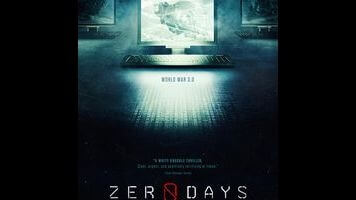Zero Days is another cursory info dump from the insanely prolific Alex Gibney

Alex Gibney has turned making documentaries into such a cottage industry over the past decade that it’s increasingly difficult to take him seriously as a filmmaker. Just since 2013, he’s directed docs about WikiLeaks, Lance Armstrong, Fela Kuti, James Brown, Scientology, Steve Jobs, and the Stuxnet worm. That list’s even split between current events and celebrities suggests opportunism more than it does passion, and so, for the most part, do the films themselves, which rarely provide more than a generic overview of their topic. Zero Days, Gibney’s latest effort, is essentially a two-hour adaptation of Wikipedia’s “Stuxnet” entry—though Gibney, to his credit, does succeed in unearthing one juicy new bit (or perhaps “byte”) of information, which was made public in The New York Times literally the day prior to the film’s premiere at this year’s Berlin Film Festival. Whether that scoop justifies Zero Days’ parade of expository talking heads—few of whom can even speak freely about Stuxnet—is debatable at best.
Most of the salient details can be summarized in a single paragraph, and here goes: Stuxnet is the name that the security community assigned to a malicious worm that turned up on computers all over the world in 2010. Though first identified in Belarus, its appearance there and elsewhere appears to have been accidental, as Stuxnet was clearly designed to target a particular brand of software (Siemens) controlling a particular type of computer (a programmable logic controller, or PLC), with the specific intent of sabotaging Iran’s nuclear centrifuges. Stuxnet’s sophistication pointed to a nation-state as the likely culprit, and it’s now widely believed that the U.S. and Israel jointly developed the project, though neither country has ever admitted involvement. Zero Days—the title refers to the nonexistent response time once the threat is identified—recounts the worldwide panic that set in upon the worm’s discovery, the painstaking efforts to reverse-engineer its purpose, and the broader concerns its existence quickly raised.
So few people in the know were willing and/or legally able to discuss Stuxnet on camera that Gibney compiles an extensive montage of apologetic non-answers to his questions; after a while, it starts to seem a shame that another recent film already claimed Stonewall as a title. This pays off, in an odd way, with an alleged NSA source whose identity is digitally obscured but who nonetheless comes across as fantastically sardonic and intelligent, with a personality every bit as arresting as the inside knowledge she reveals about Stuxnet’s development and deployment. In fact, she’s such an unusually vivid talking head that it’s no surprise at all when she’s ultimately revealed as an actress, Joanne Tucker, performing statements made by several NSA agents who refused to be filmed. Gibney previously did something similar in his Eliot Spitzer documentary, Client 9, but he gets a genuine star turn from Tucker, who may one day be as famous as her husband, Adam Driver. She’s the main reason to see Zero Days—which is pretty ironic, since she’s the one quasi-fictional element in a movie that’s otherwise strenuously “just the facts, ma’am.”
Because the Stuxnet saga is inherently fascinating, and raises so many disturbing questions about the future of warfare, any thorough rundown will be fairly compelling. The film does the job; it holds your attention. Overall, though, this is a classic “Say, why not read a book instead?” situation. (Kim Zetter’s Countdown To Zero Day: Stuxnet And The Launch Of The World’s First Digital Weapon seems to be well regarded.) Gibney huffs and puffs in an effort to make cybersecurity visually compelling, but his go-to image—multiple translucent layers of code, stacked front to back, with key fragments suddenly highlighted—only underlines how much clearer this information would be in another medium. Likewise, Zero Days’ recurring interview with New York Times correspondent David Sanger mostly inspires the desire to read Sanger’s articles, rather than listen to him recite an extemporaneous précis of them. There was no compelling reason to make a Stuxnet documentary, apart from Gibney’s apparent need to be making a documentary at any given moment. Isn’t it time for this dude to take a well-earned vacation?